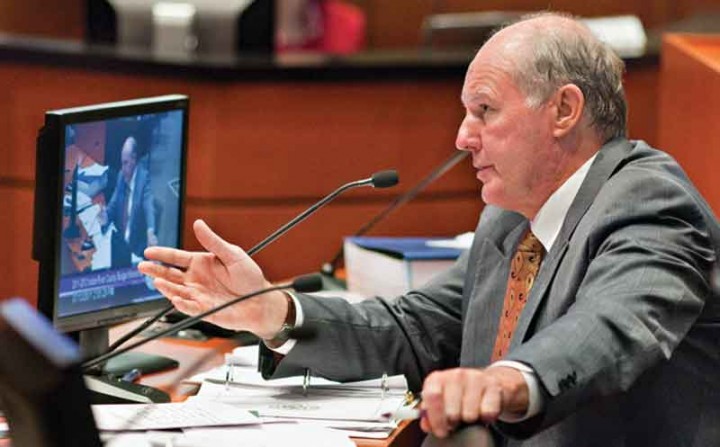INDIAN RIVER COUNTY — County Administrator Joe Baird found himself at odds with four members of the county commissioners a couple of weeks ago when they voted to refund all the impact-fee money in Fund 101 to island property owners.
“I think we are overreacting here,” Baird said. “You are going to end up in a situation where you need new infrastructure and you won’t have the money.”
For the most part, county staff and commissioners end up with at least the appearance of agreement on issues that come before the board. Most often, action staff proposes passes unchallenged; other times staff proposals are modified in response to a counter opinion from a commissioner or member of the public.
Every once in while, commissioners overrule staff and go a different direction.
But even in those cases, there is usually an element of kumbaya, with staff expressing understanding and agreement with the board’s actions.
This time, Baird continued to object to the board’s decision to return all the money in Fund 101 even as it was poised to approve that action, basically pleading with commissioners not to be carried away by short-term considerations and lose sight of the long-term good of the community – which he sees as including roadway improvements Fund 101 was meant to pay for.
“This money is not just sitting in our coffers,” Baird said. “It is there to do a road project, which is widening A1A, and I want to make it clear to you that if you refund all this money you are going to have to cut another project because our gas tax is running out. I just want that very clear.”
Fund 101 holds money collected by the county prior to 1999 on the barrier island south of Beachland Boulevard to pay for infrastructure improvements necessitated by new development.
According to county ordinance, fees not spent within six years had to be refunded, but the same ordinance allowed only a one-year refund period and no one applied before the window closed in 2005.
Last summer, former Vero Beach City Councilmember Charlie Wilson began to appear at board meetings to argue the unspent money – approximately $1.2 million in fees and interest – should be returned to some 400 property owners on the barrier island.
Staff insisted no refunds were due and said the money was needed to improve the A1A/17th Street Causeway intersection.
At first, commissioners seemed to agree with staff. But as Wilson kept up the pressure and County Attorney Alan Polackwich researched the question of impact fee refunds, which is not clearly addressed in Florida law, board sentiment began to shift.
In its most recent prior action on the matter, the board voted in December to refund $132,000 in unspent impact fees in the fund, along with interest on that money, while retaining nearly $1 million in interest that had accrued on other fees that supposedly had been spent.
That compromise was undercut when county staff revealed the amount of unspent impact fees remaining in Fund 101 was actually $255,000, nearly double the amount previously disclosed.
In part because of that error, which seemed to shake the board’s confidence in a calibrated partial refund process based on staff’s figures, Commissioners Wesley Davis and Bob Solari successfully argued for a total refund.
They were strongly supported by Commissioner Joe Flescher and Commission Chairman Gary Wheeler.
Commissioner Peter O’Bryan was the lone holdout, arguing to use some of the money in the fund for improvements to the A1A/17th Street intersection, as would have happened under the December compromise.
He said if all the money were returned and the intersection remained unimproved, future development on the southern part of the island might be hampered. He also noted that treating the actual fees and interest on the fees separately was legitimate.
“We have had two legal opinions that say we are correct in the way we have handled the money.” O’Bryan said.
Looking ahead to a more general impact fee refund ordinance Polackwich is working on to address funds other than Fund 101, Baird repeatedly cautioned commissioners not to go too far with the idea of refunding money the county may need for new infrastructure.
“We have all this pent up demand,” he said. “We have all these lots with impact fees paid and if the economy turns around in five years we may have all that demand hit and you are going to have all these projects that need to be done and no money to do them. So please keep that in mind for the good of the community.”

